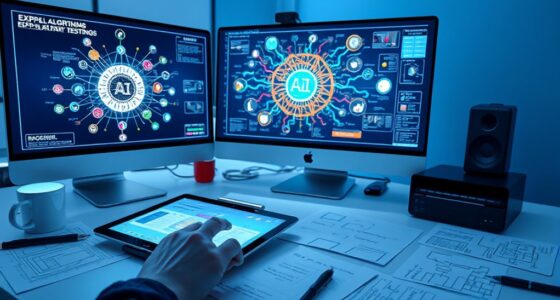Quantum computing will revolutionize your software testing by providing faster, more detailed analysis and uncovering vulnerabilities that classical methods might miss. With quantum algorithms, you can simulate complex scenarios, identify bugs quickly, and improve overall reliability. Although error correction and system sensitivity pose challenges, ongoing advancements promise more accurate results. If you keep exploring, you’ll discover how these innovations could shape the future of software quality and security.
Key Takeaways
- Quantum computing enables faster, more thorough testing by simulating complex systems and analyzing large datasets efficiently.
- Quantum algorithms optimize testing processes, helping identify bugs and vulnerabilities more quickly than classical methods.
- Advanced error correction and mitigation are essential to ensure reliable and accurate quantum-enhanced testing results.
- Quantum systems facilitate testing under extreme, real-world conditions, uncovering hidden vulnerabilities and improving software robustness.
- The integration of quantum computing in testing promises shorter cycles, deeper insights, and significantly reduced software failure risks.

Quantum computing is poised to revolutionize how we approach software testing, offering unprecedented processing power that can handle complex simulations and large datasets with ease. With this leap in computational capability, you’ll be able to simulate intricate systems and test software in ways never before possible. Central to this transformation are quantum algorithms, which are specially designed procedures that leverage the principles of quantum mechanics to perform calculations more efficiently than classical algorithms. These algorithms can optimize testing processes, identify potential bugs faster, and analyze vast amounts of data to detect anomalies that might escape traditional methods. By harnessing quantum algorithms, you’ll gain insights into software behavior at a granular level, enabling more thorough and accurate testing cycles.
However, quantum systems come with their own set of challenges, particularly concerning error correction. Unlike classical computers, quantum computers are highly susceptible to errors caused by environmental noise and decoherence. This means that maintaining the integrity of quantum information during computations is essential. Error correction in quantum computing isn’t as straightforward as in classical systems; it requires sophisticated techniques to detect and rectify errors without disturbing the quantum state. As you explore quantum-enhanced testing, understanding and implementing quantum error correction becomes indispensable. It guarantees that the results of your tests are reliable and that the quantum algorithms perform as intended, even in the face of inherent system vulnerabilities. Additionally, the sensitivity of quantum systems underscores the importance of robust error mitigation strategies to ensure accurate outcomes.
The integration of quantum algorithms and error correction techniques into software testing processes promises a future where test cycles are faster, more thorough, and more precise. You’ll be able to simulate real-world scenarios at an atomic level, uncover hidden vulnerabilities, and verify software performance under extreme conditions. This level of testing accuracy can markedly reduce the risk of software failures once deployed, leading to more robust applications. Furthermore, the ability to process large datasets quickly means you can analyze user behavior, system logs, or security threats in ways that are impractical today. As quantum computing matures, you’ll find yourself at the forefront of a new era where software testing is not just faster but fundamentally more insightful.
Frequently Asked Questions
How Will Quantum Algorithms Impact Existing Testing Frameworks?
You’ll find that quantum algorithms will revolutionize testing frameworks by enabling superposition testing, where multiple states are examined simultaneously, increasing efficiency. Quantum entanglement allows for complex interactions to be modeled more accurately, uncovering bugs faster. As these algorithms evolve, you’ll need to adapt your testing strategies to leverage quantum capabilities, ultimately making your testing more thorough and faster, paving the way for more reliable, advanced software systems.
What Skills Will Testers Need in a Quantum Computing Era?
Think of mastering quantum computing as learning to ride a new wave—exciting but demanding. In this era, you’ll need a quantum mindset and tester adaptability to stay afloat. Expect to develop skills in quantum algorithms, principles of superposition, and entanglement. You’ll also need strong problem-solving abilities and familiarity with quantum simulation tools. Embrace change, stay curious, and keep sharpening your skills—these qualities will help you navigate the quantum testing landscape confidently.
Are There Current Quantum Tools for Software Testing?
Right now, you can find quantum tools that assist with software testing, especially in areas like quantum entanglement and Qubit stability. These tools help identify how quantum states influence computations, allowing you to simulate and analyze quantum algorithms more effectively. While still emerging, they’re designed to support testing in quantum environments, ensuring your software can handle the unique challenges posed by quantum mechanics.
How Soon Can Quantum Computing Influence Everyday Software Development?
Oh, the irony is rich—quantum computing might influence your everyday software development sooner than you think. While quantum software and testing paradigms are still emerging, experts suggest breakthroughs could arrive within the next decade. So, you’ll likely see quantum-enhanced testing tools and algorithms shaping your development process sooner than you expect, revolutionizing how you handle complexity and speed, transforming software testing from a mundane task into a quantum leap forward.
What Are the Security Implications of Quantum Testing Technologies?
You should be aware that quantum testing technologies could substantially impact security. They might enable quantum encryption, which enhances data privacy by making communications nearly unbreakable. However, they also pose risks, as quantum computers could potentially crack existing encryption methods, threatening data privacy. Staying informed about these developments helps you prepare for future security challenges, ensuring your systems remain protected as quantum capabilities evolve.
Conclusion
As quantum computing continues to evolve, it’s like opening a new chapter in the story of software testing. You’ll need to adapt and harness its power to stay ahead, turning challenges into opportunities. Embrace these advancements, and you’ll find yourself steering a frontier where possibilities are as limitless as the universe itself. Stay curious and ready—because the future of software testing is a thrilling voyage into uncharted territory, waiting for you to explore.









